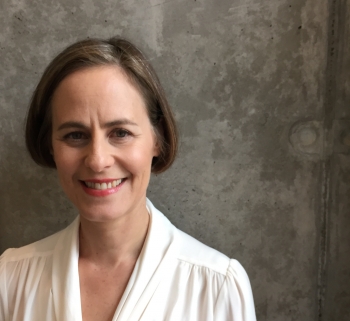
The College of Liberal Arts and Sciences (CLAS) at the University of Iowa has named Rebekah Kowal to the honor of Collegiate Scholar for 2020-2022, which recognizes faculty for excellence as evidenced in their promotion record at the time of their candidacy for promotion to the rank of full professor.
CLAS Dean Steve Goddard congratulated Professor Kowal, who is Professor and Chair of the Department of Dance, noting her national and international leadership in research on dance.
"Dance is one of humanity's oldest and most fundamental forms of artistic expression, " Goddard said, "and Professor Kowal's research helps us understand the ways that dance both reflects and shapes our diverse cultures and societies. Her work as a teacher, mentor, scholar, and dancer are recognized as excellent and impactful by her students, colleagues, and peers. I'm delighted to recognize her academic contributions with the Collegiate Scholar honor."
Rebekah Kowal joined the University of Iowa Department of Dance faculty in 2001, and has served as its Chair since 2016.
A scholarly researcher as well as a dancer, Professor Kowal seeks to forge interdisciplinary connections between dance theory and practice. She earned her PhD in American Studies from New York University and C.M.A. from the Laban/Bartenieff Institute in New York City, and teaches dance history and theory.
Her research investigates how moving bodies are compelling agents of social, cultural, and political change. She has published widely in the fields of dance and performance studies. Her articles and reviews appear in Dance Research Journal; Dance Research; TDR; Performance Research; The Returns of Alwin Nikolais, and The Oxford Handbook of Dance and Ethnicity.
Professor Kowal has earned numerous research awards, including a prestigious National Endowment for the Humanities Summer Stipend Award in 2012, and the Outstanding Publication Award from the Congress on Research in Dance for her first full-length book, How To Do Things with Dance: Performing Change in Postwar America (Wesleyan University Press, 2010). She also received Honorable Mention for the Sally Banes Biennial Publication Prize from the American Society of Theatre Research for The Oxford Handbook of Dance and Politics (Oxford University Press, 2017), which she shares with two co-editors.
She has served her profession as Vice President of the Society of Dance History Scholars and as Acting Vice President of Awards and Prizes of the Dance Studies Association. She is currently Associate Editor of Dance Research Journal.
Her new monograph, Dancing the World Smaller: Staging Globalism in Mid-Century America (Oxford University Press, 2020), examines international dance performances in New York City in the 1940s as sites in which dance artists and audiences contested what it meant to practice globalism in mid-century America. The book illuminates how debates within diverse dance contexts proxied larger cultural struggles over how to reconcile America’s new role in the world following World War II and how to become a heterogeneous and inclusive nation.
In 2009, Professor Kowal was named a CLAS Dean's Scholar, recognizing her as the top newly tenured scholar in the arts and humanities.